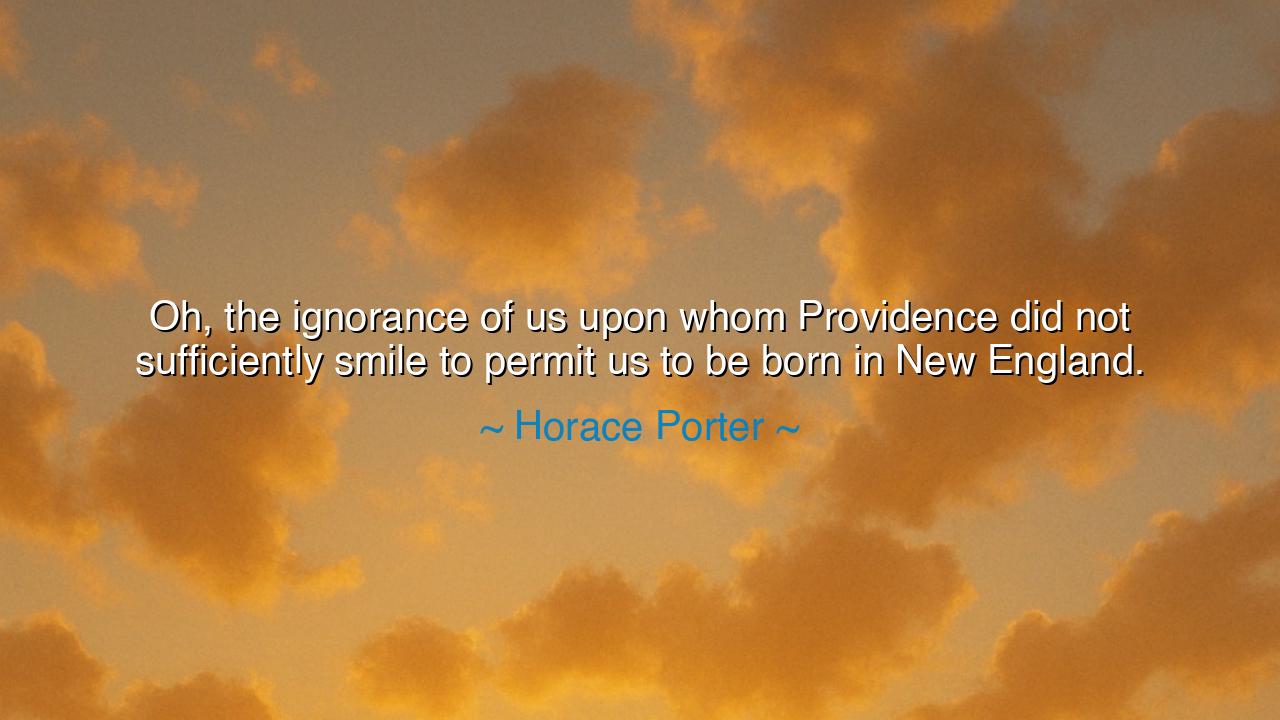
Oh, the ignorance of us upon whom Providence did not sufficiently
Oh, the ignorance of us upon whom Providence did not sufficiently smile to permit us to be born in New England.






The words of Horace Porter, spoken with both reverence and irony, carry the sound of an ancient hymn: “Oh, the ignorance of us upon whom Providence did not sufficiently smile to permit us to be born in New England.” On their surface, they may seem like flattery toward a region, but within them lies something greater—a meditation on destiny, on the mysterious favor of fortune, and on the pride of a land whose people believed themselves specially chosen.
To say that Providence did not “smile” upon one’s birth is to speak in the language of the ancients, who saw fate as a divine hand shaping the circumstances of life. Porter reflects here the high esteem with which New England was regarded in the nineteenth century: a place of learning, industry, reform, and strong cultural identity. Those not born within its bounds were, in his view, deprived of something almost sacred, as though fortune itself had withheld her blessing. Whether he spoke in jest or in earnest admiration, the message resounds: geography can shape destiny, and birthright can carry both privilege and pride.
The reference to ignorance carries with it a dual edge. On one hand, Porter laments the supposed lack of wisdom among those born outside this cradle of intellect and reform. On the other, his tone contains satire, exposing how men and women sometimes elevate their own region or heritage to divine heights, as though the world beyond their borders were lesser. In this, he teaches us to reflect: how often do we measure worth by accident of birth, rather than by character and deed?
History offers countless mirrors to this sentiment. The Athenians of ancient Greece often boasted that they alone were the true children of wisdom, born from the soil itself, while other Greeks—Spartans, Thebans, Corinthians—were seen as less refined. Likewise, the Romans, proud of their Eternal City, pitied or mocked the “barbarian” peoples beyond their empire, believing Providence had favored them alone. Yet time has shown that wisdom is not confined to one soil, nor greatness to one region. Porter’s words, though admiring, also warn us against too narrow a pride.
Yet there is truth in his praise. New England, in Porter’s time, had indeed been a forge of great movements: the birthplace of the American Revolution, the cradle of education with Harvard and Yale, the fire of abolitionists who demanded freedom, the pen of poets like Emerson and Longfellow who stirred the nation’s heart. To be born there was to be steeped in an atmosphere of discipline, intellect, and civic duty. The “smile” of Providence, therefore, was not imagined but visible in the fruits of its people. In this sense, Porter’s admiration was a recognition of cultural inheritance and the soil’s power to shape its children.
The deeper meaning is that every land, every birth, carries both advantage and challenge. To envy the “smile” of Providence upon others is natural, but wisdom teaches us to cultivate our own soil, to take pride in our own gifts, and to learn from the virtues of others. For even those born outside of “favored” places can rise through discipline, vision, and courage. History is filled with men and women who, though born in obscurity, lifted themselves to greatness by labor and determination.
The lesson, then, is this: Do not despise where you were born, nor worship too much the place of another. Instead, honor the Providence that gave you life, and with your labor, make your land worthy of blessing. Learn from the greatness of others, as Porter admired New England, but do not believe that the smile of fortune belongs to one people alone. The ignorance is not in where we are born, but in failing to see that destiny is written not only by place, but by the deeds we choose to perform.
Thus, Horace Porter’s words, whether playful or sincere, become for us a teaching across generations: that pride of place can inspire, but it must also humble. For the true smile of Providence falls not merely on regions or nations, but on the souls who rise above envy, embrace their heritage, and live with honor, wherever the winds of fate have set their birth.






AAdministratorAdministrator
Welcome, honored guests. Please leave a comment, we will respond soon